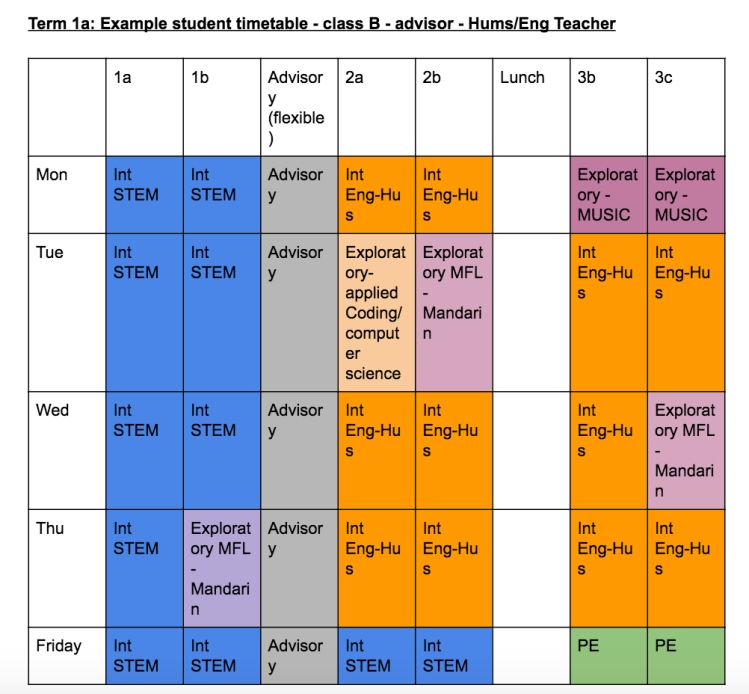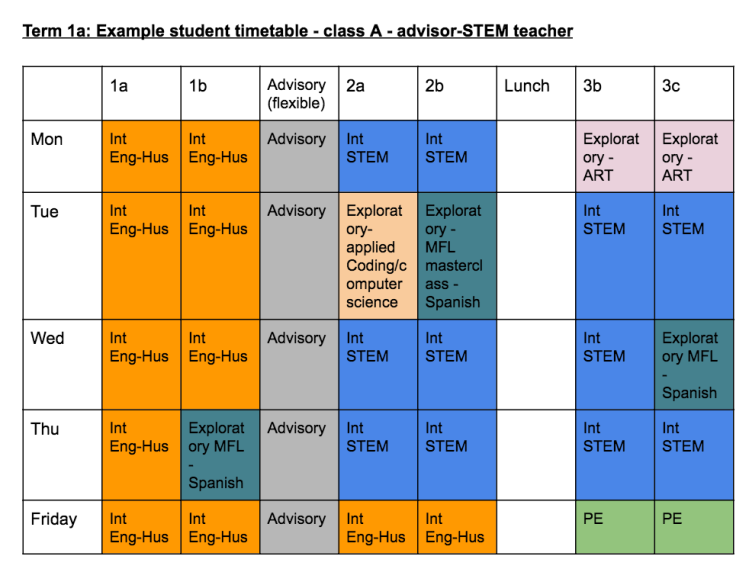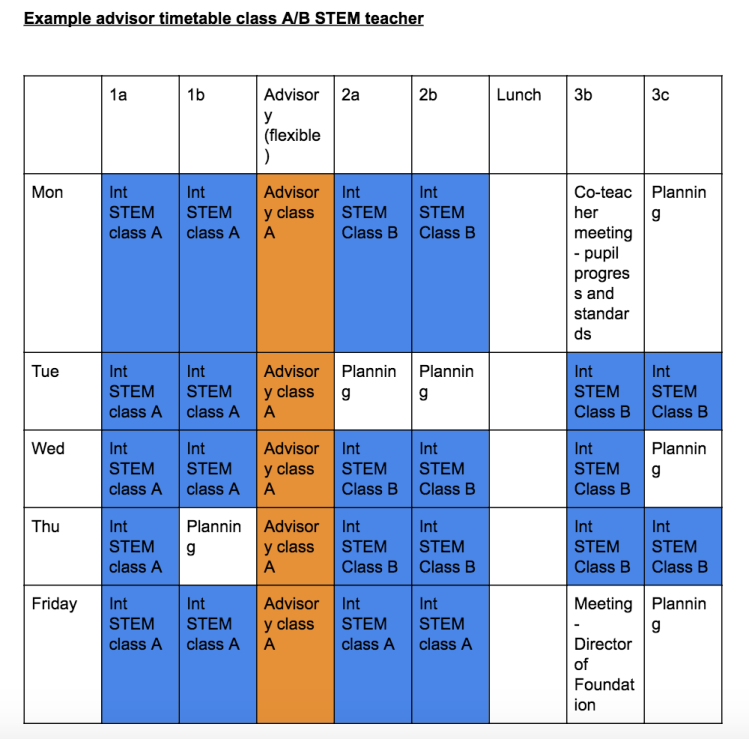An effective education could be built upon foundations of strong educator-student-community relationships. When educators spend more time with students, outcomes are usually stronger. This TES article sets out the need for teachers to spend more time to get to know each of their students. Often secondary school structures do not allow teachers to do this effectively. In primary school settings and in schools worldwide such as Big Picture and Expeditionary Learning Schools and here in the UK at XP. School, ‘advisory’ structures have been developed to ensure educators spend more time with a smaller group of students (typically 1:25). Currently students transition from a model of having one or two adults in year 6 to a typical year 7 timetable which might include 10 different subjects and even more teachers. This blog questions the efficacy of students specialising at such an early stage. It also suggests how unified ‘Connected Curricula’ can be created by developing structures that enhance teacher-student contact time and relationships.
By having a small group of core educators developing a ‘foundational’ curriculum only, time and increased synergy is created that could lead to a highly effective curriculum offer. This will mean that a core group of staff can work closely together to plan exciting schemes of learning with clear purposes, processes and products. The aim of this rebooted curriculum model would allow students to master knowledge and skills, develop their learner attributes and ensure high quality work. This could be much more likely in an ‘advisory’ structure as suggested below.
What if at a 6 form entry school, year 7 classes are distributed into 6 classes of 30 students, which is not unusual. A team of educators and a ‘Director of Foundation stage’ could work to ensure highly effective outcomes with this year group only. Furthermore, a core group of teachers supporting the foundational year group only will lead to improved relationships with students and rapid improvement in curriculum and assessment design. What if some additional space and time was created by teaching less students over the course of a week and through team planning. This may give those core teachers and the director the capacity to;
- Increased planning time for the 6 core foundational educators to develop significant disciplinary, interdisciplinary and cross disciplinary schemes of learning.
- Increased time for the 6 core educators (advisors) to develop home-school partnerships and have increased pastoral responsibilities.
- Increased time to effectively monitor student progress. This can be achieved by more effective use of student data. Data can be more valid as core educators will have more time to standardise student work and develop valid assessments of student progress.
- Increased time to evaluate the effectiveness of the curriculum and teaching strategies. This may be achieved through lesson study and deep diving into student work.
- Develop new forms of presenting student progress. Creating of systematised ‘Celebrations of Learning’ and bi-yearly ‘Student-Led Conferences’.
What if the 6 classes of 30 will be split into 4 main subject areas;
- Integrated English-Humanities – 11 lessons per week with a focus on developing student literacy and oracy. Time for integrated philosophical discussion would also be planned. Geographical topics may sit across both this and the STEM subject.
- Integrated STEM – Maths, Science, Engineering – 11 lessons per week. Maths masterclasses to allow ‘deliberate practice’ would be delivered but also those essential skills applied across science-engineering units of work.
- Exploratory – These will be on a half termly rotation, ensuring that the Core subjects above can be ‘mirrored’ but also gives more time for clear purpose-process-product per half term in a double period. Rotation 1: Drama, Music, Art, Rotation 2: Computer Science (1) , MFL 3 lessons per week. Some of these skills can be applied to products within the core curriculum.
- Physical education 2 lessons per week.
There will be 6 core class teachers who also act as advisors for one of the classes. These teacher will teach two different classes in a partnership, giving potential for team planning and teaching. Integrated STEM may include 1 Engineering, 1 Maths, 1 Science specialist. Integrated English-Humanities should be at least 1 English and 1 History specialist. However, there is also the possibility for more flexible staff to be appointed from the primary sector within this approach. What if this approach could go someway to resolving recruitment issues at secondary level.
A ‘Director of Foundation’ would oversee and lead both the pastoral and teaching & learning for the Foundation year group. His or Her responsibilities would include;
- ‘Tsar of rigour’: To observe and conduct regular learning walks, giving regular and honest feedback to teachers on the learning that is taking place. Developing approaches to CPD and collaboration within the foundation team to constantly drive to improve standards. Someone who is highly knowledgeable of curriculum, pedagogy and assessment.
- Leading and reviewing the effectiveness of the curriculum. Evaluating the impact of schemes and projects alongside the foundation team.
- A teaching allocation, but this may be more flexible i.e. to cover core teachers to give opportunities for more expansive opportunities for students or time to plan or meet parents for example. Provide cover to increase Math-Science allocation (reducing Eng-Hums per half term).
- Overall pastoral responsibility, meeting and supporting parents. Overview of behaviour for learning. Working with individual students where necessary.
- Line and performance management of the 6 core Foundation educators/advisors.
- Deliver and plan assemblies with advisors and students that are interactive and are purposeful within a ‘Connected Curriculum’.



What if standards and expertise from traditional curriculum areas are used in the design and implementation of a rebooted Foundational curriculum. Subject experts will be ‘bought in’ to help design schemes of learning in ‘project tuning’ sessions e.g. on whole school planning days. A set of standards and essential knowledge, understanding and skills will be developed for each traditional subject discipline as a road map for the redesign of a foundational curriculum.
Distinguishable pedagogical and curriculum approaches
Maths mastery: What if students have maths masterclasses within their core Integrated STEM classes. This could be based on a rotation model where students are assessed on skills they can master and split in the class to master each skill. There is no need for setting in this approach. The 3 core teachers will be highly trained to teach in a mixed ability session.
Literacy: What if highly effective literacy strategies are integrated into the redesign of a foundational curriculum. The integrated approach will allow students to experience a rich variety of text and reading, opportunities to present and develop their oracy and write for real and varied audiences. However, time for reading of texts would also be used within a framework of developing rich disciplinary knowledge within a defined unit of work.
Purpose-Process-Product: What if in the integrated core lessons of the foundational curriculum, schemes are developed so that learning truly allows students to practice a range and knowledge, skills and attributes and allows them to create new knowledge and demonstrate excellence through clear purposes, processes and products. What if lessons are highly personalised and relevant to real world or aims of the course.
Experiential learning: What if students have various trips and experiences over their foundation year at secondary school. Experiential learning that is integrated and relevant to their courses of study. Students will be more able to partake in regular field work as part of their course within this new curriculum structure.
What if half termly schemes of learning are fully integrated and planning within a framework of engaging Big Ideas and Driving Questions. Students will work towards a final exhibited products.
Thoughts on how to make this possible or even better welcomed!